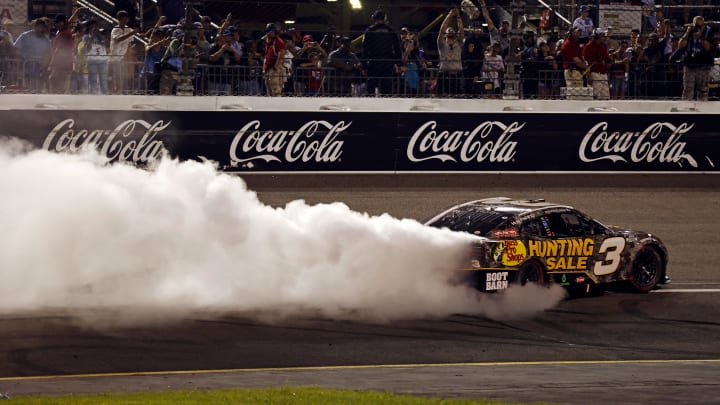Elton Sawyer: Sorry for Delay of Dillon Penalty, NASCAR Wanted to Get it Right

On Wednesday afternoon, NASCAR finally dished out the anticipated penalties stemming from the chaotic finish of Sunday's NASCAR Cup Series Cook Out 400 at Richmond Raceway. Ultimately, the sanctioning body opted to let Austin Dillon keep his fifth-career win, but NASCAR stripped the driver and his team from the Playoff berths in the driver and owner standings that came along with the win.
NASCAR Vice President of Competition, Elton Sawyer addressed the ruling with the media in a Zoom call on Wednesday afternoon, where he apologized to the fans for the length of time it took for the sanctioning body to come to a decision, but the 64-year-old said NASCAR ultimately wanted to make the right decision in the matter over making a hasty quick call.
"Obviously, the magnitude of this decision was and is huge so we felt it was very important that we get this right," Sawyer explained. "Starting Sunday night, gathering all of the data. Working again on Monday, all day yesterday. Looking at all of the SMT data, looking at in-car cameras, obviously, the audio. Gathering all of those facts, the meetings that we needed. Totally understand our fans, I want to apologize to them for this taking as long as it did. They've been patient through this process. So, I'm talking to them now, letting them know why it took so long to get to this decision."
Sawyer went on to say that NASCAR has speeding up the process of announcing penalties in the future.
"Yeah, I think ultimately we would like to, and we will get to a place where we make this more on the spot if you will," Sawyer said. "Again, we wanted to make sure, the most important thing in these decisions is to get it right. And to make a split-second decision and it to be wrong, that would be bad on our part. The stewards of the sport, the amount of time it took, and in this case, getting it right versus being fast on the decision. It was more important to take the time to get it correct. But it does put us, I would say, in a position that we're looking hard at how we would have done this in a much faster manner."
According to Sawyer, it wasn't one singular action from Dillon on the final lap at Richmond that led to the sanctions from NASCAR, the VP of competition says it was the confluence of all of the moves that Dillon made from the entrance of Turn 3 where he spun Joey Logano, to the exit of Turn 4 where he right-rear hooked Denny Hamlin, to the start finish line, where Dillon ultimartely won the race.
"If you take the total kind of body of work, if you will, starting in Turn 3 the contact with the 3 and the 22, and as it progressed all the way through [Turns] 3 and 4, and the contact with the 3 and the 11 all the way through the start-finish line; we took all of that in totality as we looked at it," Sawyer stated.
Ultimately, the ruling that NASCAR made was done so in an effort to protect the series championship as well as the legitimacy of each weekend's finish going forward.
"The number one thing is we want to make sure we are protecting the integrity of our Playoffs as well as our Championship when we get to Phoenix. We want to make sure our competitors understand that we want them to make all of the decisions. We want them to be able to race hard. That's what our sport has been about for 75-plus years. But we also want them to understand, and I believe, each and every one of them understands that this crossed the line."
While NASCAR's penalty report sent a strong message to the competitors in the sport of what will and won't be acceptable in battles for the win in the NASCAR Cup Series, many wondered why NASCAR didn't strip Dillon of the win totally. Sawyer says that while NASCAR will look at adding a provision to the rule book in regards to stripping race wins, there simply wasn't anything currently in the rule book that allowed them to take the race win away.
"At the moment, we did," Sawyer said when asked if NASCAR thought about taking Dillon's win away. "As we looked through the rule book, there's not, at the moment, there's not really a mechanism in the rule book that gives us that option. That's something we can look at in the future. But just based off our rule book, which we used to guide us in this decision, that's how we arrived where we did."
The other pressing question became; why didn't Dillon get suspended for an intentional right-rear hook on Hamlin? Other drivers, including the sport's most popular driver Chase Elliott, and Bubba Wallace have been suspended for similar situations over the last couple of seasons. Sawyer says that every situation is a different set of circumstances.
"We looked at the situations with Bubba and Chase, and they were incidents on mile-and-a-half racetracks at 160 miles-per-hour, not to say Richmond is one that you would not take in consideration [for suspension] on that type of move, but each individual situation is different," Sawyer explained.
At the end of the day, Sawyer wants to make it clear that what Dillon did in pursuit of a desperation hail mary win at Richmond will not be tolerated, but he also wants to be clear that NASCAR does not want to dissuade drivers from partaking in traditional hard-nosed NASCAR full-contact racing.
"...as I said earlier, we encourage that. We want our race car drivers to go out and race hard and contact, as I said Sunday night, that's been our DNA for 75-plus years," Sawyer said. "But what happened Sunday night, in NASCAR's view, and again, looking at all of the data and analyzing that and talking about it, that crossed a line. That's not the type of racing, that's not how we want our races to end. That's not the we want to decide a champion, that's not the way we want to decide an event."
